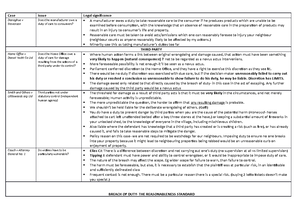- Information
- AI Chat
Was this document helpful?
Candler v Crane - Detailed case brief, including paragraphs and page references Topic: Negligence
Course: The Law of Torts (LAWS212)
621 Documents
Students shared 621 documents in this course
University: Victoria University of Wellington
Was this document helpful?

Candler v Crane, Christmas and Co
Area of law concerned: Negligent Misstatement
Court: Court of Appeal (England)
Date: 1951
Judge: Denning LJ (dissent), Asquith LJ
Counsel: Mr Foster for the defendants
Summary of Facts: Plaintiff invested in a company in reliance on accounts produced by the
defendant, who had been told that he would use them as a basis for his
investment. The accounts had overstated the value of the company and
after its collapse the plaintiff sued to recover both his original
investment and subsequent investment.
Relief sought:
Issues: Did the accountants owe a duty of care to the plaintiff?
Relevant Statute(s):
Procedural History:
Plaintiff/Appellant’s
arguments
Although there was no contract between the plaintiff and the
accountants, nevertheless the relationship between them was so close
and direct that the accountants did owe a duty of care to him within the
principles stated in Donoghue v Stevenson.
Defendant/Respondent’s
arguments:
The duty owed was a purely contractual duty owed by them to the
company, and therefore they were not liable for negligence to a person
to whom they were under no contractual duty.
Result:
Judge’s reasoning: Donoghue v Stevenson ‘exploded’ an error of law that existed up till
then, deciding that the presence of a contract did not defeat an action
for negligence by a third person, provided that the circumstances
disclosed a duty by the contracting party to him
An error resolved by Donoghue
394
The second error was from Derry which stated that no action ever lies
for a negligent statement even though it is intended to be acted on by
the plaintiff and is in fact acted on by him to his loss
Existence of negligent misstatement
394
The defendant’s first submission is that a duty to be careful in making
statements arose only out of a contractual duty to the plaintiff or a
fiduciary relationship to him.
This is a bad argument because the categories to negligence are never
closed.
Bottom 394 to top 395
The second submission is that a duty to take care only arose where the
result of a failure to take care will cause physical damage to persons or







